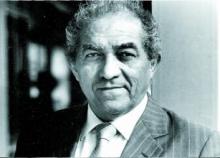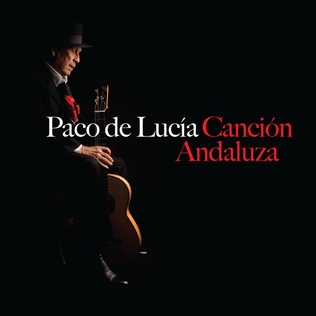Danny Rivera is a Puerto Rican singer and songwriter born in San Juan whose career spans nearly 50 years. He is well known in Puerto Rico for his political activism. In 2008, Rivera acquired Dominican Republic citizenship. After 12 years of work, Danny Rivera and Nelson González in 2014 finished work putting new life into the classical bolero - in Spanish. Rivera and González Hit the Heart of the Latin American Song Book on Obsesión

Hermes Davide Fastino Croatto Martinis, better known as Tony Croatto, was an Italian singer and composer best known for his interpretations of Spanish folkloric songs and music from Puerto Rico. His musical career began as part of the sibling musical group, Los TNT, with his siblings Nelly and Tim. He was also a television presenter.

Andrés Montañez Rodríguez, better known as Andy Montañez, is a Puerto Rican singer and songwriter.
Marvin Santiago was a Puerto Rican salsa singer who became famous all across Latin America during the 1970s. He was also a part-time comedian on Puerto Rican television.

Héctor Eduardo Reglero Montaner, better known as Ricardo Montaner, is an Argentine-born Venezuelan singer. Since starting his career in the late 1970s, he has released more than 24 albums, and many successful singles. He has sold an estimated 10 million records worldwide, making him one of the best-selling Latin music artists.
Pellín Rodríguez was a Salsa singer. Rodríguez was a member of the musical group El Gran Combo and toured with them all over Latin America and Europe, gaining fame and popularity as a singer. In addition to his singing capabilities, Rodríguez had great comedic abilities and participated on comedy bits on various TV shows in Puerto Rico.
A descarga is an improvised jam session consisting of variations on Cuban music themes, primarily son montuno, but also guajira, bolero, guaracha and rumba. The genre is strongly influenced by jazz and it was developed in Havana during the 1950s. Important figures in the emergence of the genre were Cachao, Julio Gutiérrez, Bebo Valdés, Peruchín and Niño Rivera in Cuba, and Tito Puente, Machito and Mario Bauzá in New York. Originally, descargas were promoted by record companies such as Panart, Maype and Gema under the label Cuban jam sessions. From the 1960s, the descarga format was usually adapted by large salsa ensembles, most notably the Fania All-Stars.

Jonathan Daniel Montenegro Uzcátegui is a well known Venezuelan actor and singer. Montenegro was a member of the popular Puerto Rican boy band Menudo.

"¡El pueblo unido jamás será vencido!" is a Chilean protest song, whose music was composed by Sergio Ortega Alvarado and the text written in conjunction with the Quilapayún band. Together with the song "Venceremos", also by Ortega, it is one of the most successful songs of the Nueva canción chilena movement. The theme has a marching rhythm, highlighting its chorus, which is a shout or slogan with only percussion. The song has been used in various protests around the world against either left or right-wing dictatorships, most of which have no direct connection to the Chilean coup or Latin America. The lyrics have been adapted or translated into many languages.

Juan Pablo Knipping Pacheco, known as Johnny Pacheco, was a Dominican musician, arranger, composer, bandleader, and record producer. Born in the Dominican Republic, Pacheco became a leading figure in the New York salsa scene in the 1960s and 1970s as the founder and musical director of Fania Records.

Pedro Juan Rodríguez Ferrer, better known as Pete "El Conde" Rodríguez, was a salsa singer born in Barrio Cantera, Ponce, Puerto Rico. His son, also named Pete Rodriguez, is also a salsa and jazz musician. His daughter, Cita Rodriguez, is also an accomplished salsa singer.

Los Cañoneros is a Venezuelan cañonero group. It was created to emulate the times and songs of Caracas in 1920. They made their first public appearance in Mérida, in the Bullfighting Arena of Mérida November 20, 1982.

Alí Rafael Primera Rosell was a Venezuelan musician, composer, poet, and political activist. He was born in Coro, Falcón State, Venezuela and died in Caracas. He was one of the best known representatives of Nueva canción in Venezuela – his songs "condemning exploitation and repression, and celebrating resistance, struck a chord among a wide public," and he is popularly known in Venezuela as El Cantor del Pueblo. In 2005, the government of Venezuela declared his music to be an example of the national heritage of Venezuela.
Alfredo Rodríguez was a Cuban pianist who played Afro-Cuban music as well as Latin jazz. Born in Havana, his musical career began in New York, where he struggled to establish himself, playing with dozens of Latin music groups over two decades. In 1983, he moved to Paris, where he enjoyed greater success, recording several albums as a leader to critical acclaim. In his later years, he founded a new group, los Acerekó, featuring Tata Güines, Changuito and Joel Hierrezuelo among others.
Cruz Manuel Hernández Santiago, known artistically as Manny Manuel, is a Puerto Rican musician and singer of merengue, bolero, and tropical music. He became famous first as a member of the group Los Sabrosos del Merengue, before launching a successful solo career in 1994.
Los Freddy's were a Mexican musical group, founded in 1962 in Guadalajara, Jalisco.
While the Dominican Republic is known for shaping merengue and bachata music, its musicians have also melded these influences into the early development of salsa music amongst the Latin community of New York City in the early 1960s. A major development in those initial days of salsa occurred when Johnny Pacheco, a Dominican-born musician living in New York City, teamed with partner Jerry Masucci to create Fania Records in 1964. They started selling records from the trunk of cars on the streets of Spanish Harlem, signing up young artists, creating new sounds, and eventually having hit records. Over the next 15 years, Fania Records helped define the sound, culture, and language associated with the salsa genre, a musical movement that arose partly from the unavailability in the United States of music produced in Cuba.

Jesús Rosas Marcano, was a Venezuelan educator, journalist, poet and composer of folk songs popularized by the group Un Solo Pueblo, such as "Botaste la bola" and "Negro como yo".
The term fulía refers to a variety of folk genres in Venezuela generally performed as part of the vigils of the Cruz de Mayo. Of these genres, there are two that are especially prominent: the fulía central and the fulía oriental or cumanesa.

Canción Andaluza is the final studio album by Spanish musician Paco de Lucía, released on April 29, 2014 through Universal Music Spain. It was released posthumously after his death on February 25, 2014. Produced by de Lucía himself, it features collaborations with fellow Flamenco singers Estrella Morente and Vicente Castro "Parrita", and Venezuelan salsa musician Oscar D'León.










